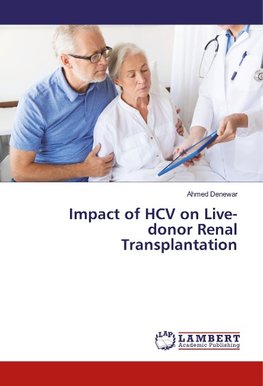
-
 Anglický jazyk
Anglický jazyk
Impact of HCV on Live-donor Renal Transplantation
Autor: Ahmed Denewar
Renal transplantation represents the optimal treatment for patients with end stage kidney disease. When compared with dialysis, a successful renal transplant not only offers improved quality of life, better social rehabilitation, and less economic cost,... Viac o knihe
Na objednávku
51.75 €
bežná cena: 57.50 €
O knihe
Renal transplantation represents the optimal treatment for patients with end stage kidney disease. When compared with dialysis, a successful renal transplant not only offers improved quality of life, better social rehabilitation, and less economic cost, even in high risk patients, but also allows a longer life expectancy. The advent of molecular characterization and cloning of the HCV genome was followed by the identification of HCV as the major cause of parenterally transmitted non A, non B, hepatitis (NANBH). There are several reasons why renal transplant populations are at potential risk of developing hepatitis C. Most patients have received multiple blood transfusions. Additionally, a higher HCV prevalence was found in non-transfused hemodialysis patients suggesting that modes of HCV transmission other than blood transfusion, probably nosocomial, play some role in the dialysis setting. Furthermore, the possibility that donor organs may transmit HCV has been documented. Whereas some investigators reported the safety of transplanting HCV infected end stage renal disease (ESRD) patients, others demonstrated an increased risk of death due to sepsis, hepatic.
- Vydavateľstvo: LAP LAMBERT Academic Publishing
- Rok vydania: 2017
- Formát: Paperback
- Rozmer: 220 x 150 mm
- Jazyk: Anglický jazyk
- ISBN: 9786202074148












